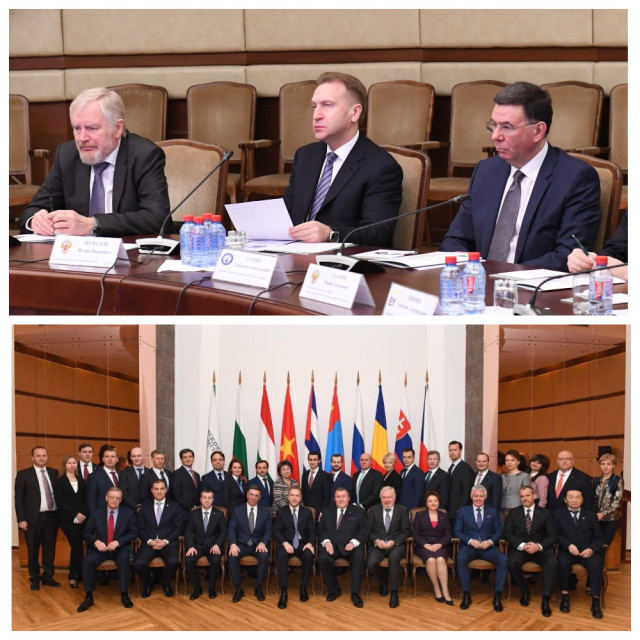Igor Shuvalov Supports IIB’s Institutional Reform and Its Plans for the New Strategic Development Cycle

First Deputy Prime Minister of the Russian Federation Mr. Igor Shuvalov announced Russia’s support for the development plans of the International Investment Bank (IIB) and in particular for its new strategic cycle 2018- 2022. Mr. Shuvalov visited the IIB’s headquarters and attended the enlarged meeting of the Bank’s Board on January 22, 2017.
The meeting reviewed the results of the IIB’s five-year strategic cycle that was completed in 2017, discussed the most significant projects implemented with the participation of the Russia state, and analyzed opportunities associated with the effective implementation of the Bank’s 2018-2022 Development Strategy. The event was also attended by Sergey Storchak, Deputy Minister of Finance of the Russian Federation, Head of the Russian Delegation to the IIB Council, Alexander Pankin, Deputy Minister of Foreign Affairs of the Russian Federation, Gennady Shinin, E&Y Partner, and IIB Board members and Directors.
In his opening speech, Nikolay Kosov, Chairman of the IIB Board, announced that the Bank had completed the key objectives of the preceding five-year cycle and achieved a level of financial stability at which it is able function as a fully fledged modern, multilateral development institution. Between 2013 and 2017, the assets of IIB Group nearly tripled, while the loan portfolio grew tenfold, with investment coverage from all member states. The Bank’s total investments in the economies of its member states has reached EUR 1.2 billion over the past five years. The IIB resumed financing large infrastructure projects and was assigned investment-grade ratings by all leading international rating agencies.
Mr. Shuvalov gave a positive evaluation of the results of the IIB’s institutional reform and gradual development, stressing that the results achieved in all areas “far exceeded the expectations of the optimistic scenario of the 2013-2017 Strategy”. The meeting especially noted the Bank’s efforts aimed at increasing the scale of its investment operations, as well as at expanding its geographic footprint with a well-balanced distribution of investments across its member states.
Mr. Shuvalov pointed out the IIB’s ever increasing role as an international development bank promoting effective integration between the economies of its member states. This was made possible first of all owing to the Bank’s participation in major infrastructure projects, the launch of a large-scale trade finance programme, and its valuable contribution to the innovative development of its member states’ capital markets.
An illustrative result of the IIB’s work is the diversification of its loan currencies: last year, for the first time in its history, the Bank extended loans in Russian rubles, Hungarian forints, and Romanian lei. “Clearly, this has great significance both for supporting the national currencies of member states and for the local business community”, said Mr. Shuvalov.
The meeting reviewed the results of the 108th IIB Council, which was held in Slovakia in December 2017 and kicked off the practical implementation of the Bank’s 2018-2022 Development Strategy. The foremost areas of the Bank’s strategic development include plans to increase the IIB’s assets to EUR 1.7 billion, with a 70% share of the loan portfolio, the Bank’s new capitalization programme beginning from 2020, increasing loan amounts in member states, acquiring new members, and expanding the geography of its operations.
It was stressed that the achievement of key objectives of the new growth strategy is largely contingent upon consistent shareholder support for the Bank’s sustainable development and entry into force of the new statutory documents. As soon as the documents are ratified, the Bank will switch to a three-level governance system (Management Board, Board of Directors, and Board of Governors) and a voting system proportionate to contributions to the paid-in capital, and will increase its authorized capital to EUR 2 billion.
The implementation of the Bank’s new Strategy “requires respective capital increases, and we are prepared to work towards achieving them”, said Mr. Shuvalov. He expressed support for the “consistent expansion of the IIB’s shareholder structure, which should meet the interests of all of the Bank’s member states. This is one of the main ways to expand the IIB’s geography of operations, increase and diversify the resource base and loan portfolio”.
Russia is the IIB’s major shareholder, with a share of 47.63% in the paid-in capital. Since late 2012, the Bank has signed 13 loan agreements with Russian borrowers for a total of over EUR 350 million. In 2017, the IIB participated in financing the construction of two small hydro power plants in northwest Russia as part of the Federal Target Programme “Development of the Republic of Karelia for the Period Until 2020”. The project, worth a total of RUB 12 billion, provides for the construction of a chain of White Rapids hydro power plants with a total capacity of 49.8 MW. At the same time, the Bank is actively engaged in financing foreign projects requiring the application of Russian technology and Russian-made equipment and materials. As of today, the share of projects with a Russian component in the IIB’s overall loan and instrument portfolio is 41%.
The Russian party continues supporting the Bank’s development. In 2014, Russia contributed EUR 10 million to the IIB’s paid-in capital and ratified its new statutory documents in 2016. Also, the Bank signed memoranda of understanding with Russian Ministry of Foreign Affairs and Russian Ministry of Economic Development, was included in the national programme of project finance, and is actively participating in the project to create an international financial center in Moscow and in other important business initiatives.
